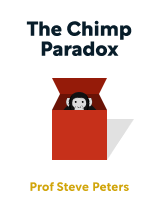

This article is an excerpt from the Shortform book guide to "The Chimp Paradox" by Steve Peters. Shortform has the world's best summaries and analyses of books you should be reading.
Like this article? Sign up for a free trial here .
Are you looking for The Chimp Paradox quotes? What passages can help you to understand your inner Chimp? How can you apply The Chimp Paradox quotes to your own life?
In The Chimp Paradox, Steve Peters offers advice for improving your relationships, controlling your emotions, and finding your purpose. The following The Chimp Paradox quotes highlight some of his key ideas.
Learn more about the most important The Chimp Paradox quotes.
The Chimp Paradox: Quotes With Explanations
In The Chimp Paradox, Steve Peters offers advice for managing your inner Chimp. In this book, you can also find advice about relationships, success, confidence, and happiness.
Here are some of the best quotes from The Chimp Paradox, with explanations:
“When you decide to do something, remind yourself that it is commitment not motivation that matters.”
Both your Chimp and your Human must commit to a project if you’re going to successfully stick with it. Commitment is more than motivation: Motivation is ruled by emotions (by your Chimp), but such emotions can be fleeting. Motivation alone won’t pull you through a project because as soon as you “don’t feel like” doing it, you’ll abandon it.
In contrast, commitment is following a plan even if you don’t feel like it, and comes from the Human part of your brain.
“Remember: you can’t use your Chimp as an excuse. If you had a dog and it bit someone, you couldn’t just say, ‘Sorry but it was the dog, not me.’ You are responsible for the dog and its actions. Likewise, you are totally responsible for your Chimp and its actions. So no excuses!”
Your Chimp is your responsibility as much as your dog would be your responsibility: If your dog attacks someone, you can’t simply shrug and say, “It was the dog, what can I do?” In the same way, you can’t can’t use your Chimp as an excuse to justify your own poor behavior—for example, you can’t snap at someone and then simply say, “It was my instinct, no big deal.”
“The very simple question, therefore, is to begin with ‘Do I want…’ and then finish the sentence. For example: ‘Do I want these feelings?’ or ‘Do I want these thoughts?’ or ‘Do I want to be behaving this way?’ If the answer is ‘no’ then you are in Chimp mode and if the answer is ‘yes’ then you are in Human mode.”
When you have an immediate emotional reaction, you can recognize it as your Chimp by asking yourself if you want to feel this way. For example:
- If you’re worrying about something, ask, “Do I want to feel anxious?”
- If something upsets you, ask, “Do I want to feel angry?”
- If you can’t motivate yourself to do something you know you need to do (such as catch up on a work project or organize your basement), ask, “Do I want to feel apathetic?”
If you answer “no” to these questions, then your Chimp is in control of your emotions.
“When people have accidents that damage their frontal lobe or when they have a disorder or illness affecting the frontal lobe, their personality alters. Effectively, the Human part of the brain stops working and the new personality that presents is the Chimp. Very often, people affected in this way will become disinhibited and lose their judgment or they can become apathetic or have outbursts of aggressive behavior.”
The importance of the Human part of the brain (the frontal lobe) is evidenced by what happens when it stops working properly. People who have suffered injuries to their frontal lobes lose the ability to regulate their emotional impulses. A famous example of this was Phineas Gage, a railroad employee in the late 19th century who survived an explosion that thrust an iron rod through his eye and out the top of his skull, destroying his frontal lobe but leaving him otherwise functional. After the injury, his personality completely changed; while he had once been careful, responsible, and thoughtful, he instead turned foul-mouthed, impulsive, and aggressive.
“A golden rule for understanding people and situations is to always try to establish the facts before you make your assessment.”
Your Chimp is emotional and irrational. Therefore, when it reacts to a situation, it:
- Jumps to conclusions: A Chimp makes fast judgments before it has a full set of information.
- Thinks in black and white: Chimps see situations as either very good or very bad, and are unable to process subtleties.
- Digs in: Chimps don’t often consider alternate points of view or other interpretations, and once they’ve chosen a stance, they tend to defend it blindly, regardless of what additional information comes to light.
- Is paranoid: Your Chimp has evolved to look out for danger and therefore defaults to paranoia in situations where it doesn’t understand what’s going on. The more insecure your Chimp feels, the less trusting it becomes, and in uncomfortable situations, it can easily interpret harmless situations as dangerous—for example, it might hear offhand comments and assume they’re insults.
- Thinks catastrophically: Because of its tendency to see danger everywhere, your Chimp overreacts to situations with intense emotion, anxiety, and despair.
- Thinks irrationally: Because your Chimp jumps to conclusions, it doesn’t evaluate whether something is likely or realistic before settling on an opinion. Therefore, its thoughts are often ungrounded in reality or logic.
- Judges first, questions second: A Chimp makes its judgments based on feelings and impressions and only then looks for facts and rational to back up its decisions.
When a Chimp reacts with these instincts, it can cause problems that could have been avoided.
These explanations of The Chimp Paradox quotes can help you to better understand key passages from the book.

———End of Preview———
Like what you just read? Read the rest of the world's best book summary and analysis of Steve Peters's "The Chimp Paradox" at Shortform .
Here's what you'll find in our full The Chimp Paradox summary :
- Why we struggle to control our urges, succumb to temptation, and sabotage our own success
- How to manage your inner chimp to become happier, more balanced, and successful
- Why your psychological world is like a solar system with 7 planets






